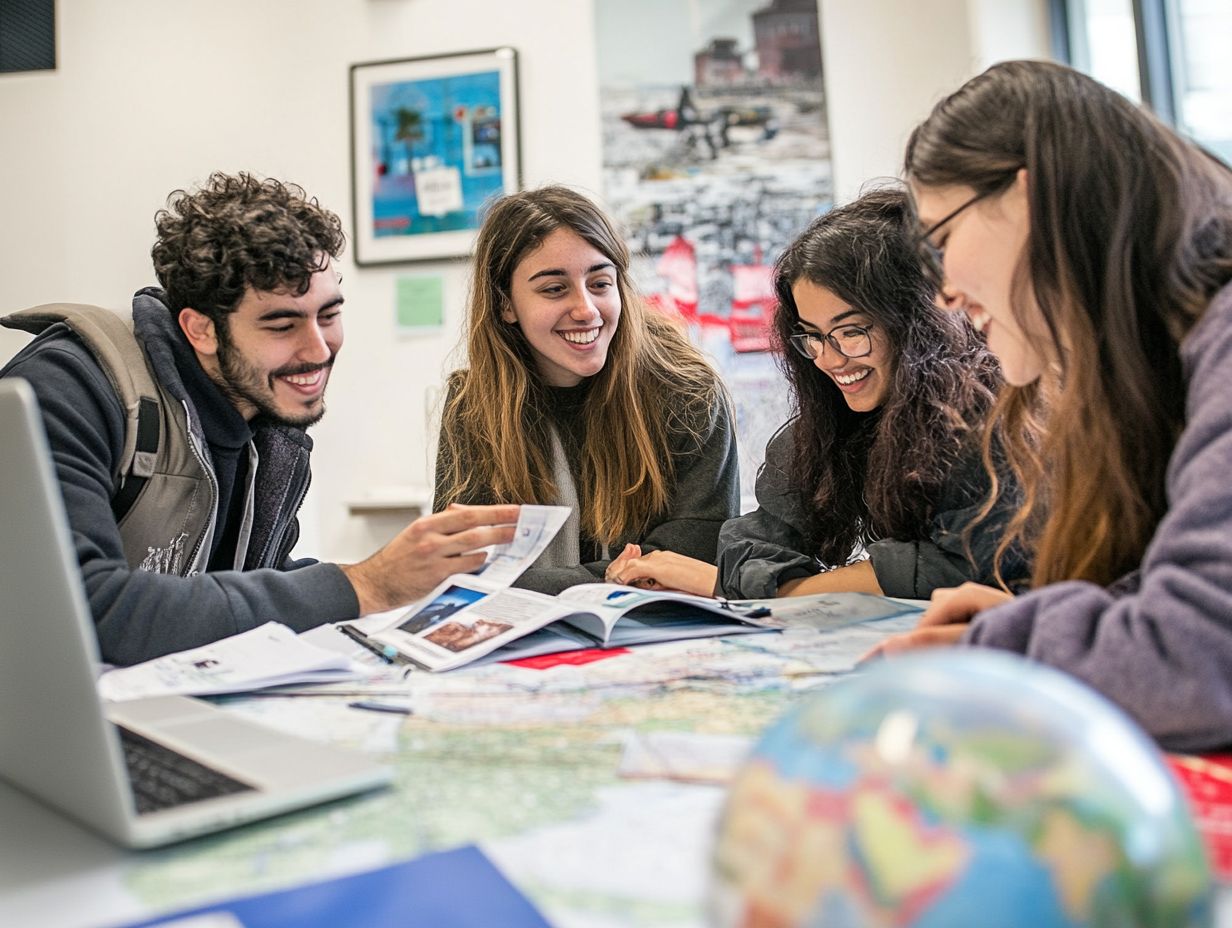How to Evaluate Your Study Abroad Options
Choosing to study abroad presents an exhilarating opportunity that can significantly elevate your education and personal development.
With many programs at your disposal, pinpointing the right fit can feel daunting. This guide covers vital factors to consider, including your academic aspirations, preferred location, and budget constraints.
It examines various program types, from traditional semester-long experiences to short-term internships, and provides insightful tips to refine your options.
Get excited! This guide is packed with practical tips to launch your adventure!
Contents
- Key Takeaways:
- Factors to Consider When Choosing a Study Abroad Program
- Types of Study Abroad Programs
- Researching and Narrowing Down Your Options
- Preparing for Your Study Abroad Experience
- Logistics and Travel Arrangements
- Cultural and Language Preparation
- Frequently Asked Questions
- What factors should I consider when evaluating my study abroad options?
- How can I determine if a study abroad program is reputable?
- What are some resources I can use to compare different study abroad programs?
- How can I assess the overall cost of a study abroad program?
- What questions should I ask the study abroad program provider?
- How can I make a well-informed decision about my study abroad options?
Key Takeaways:

- Consider your academic goals, location, and financial aid options when choosing a study abroad program.
- Explore traditional, short-term, and specialized programs to find the best fit for your academic and personal goals.
- Utilize resources and personal connections to research and narrow down your options, and prepare logistically and culturally for your study abroad experience.
Factors to Consider When Choosing a Study Abroad Program
Selecting the right study abroad program is crucial for students eager to elevate their educational experience, especially in the evolving landscape shaped by the COVID-19 pandemic. To make an informed decision, you’ll want to assess factors such as your academic goals, the program’s location, costs, and the support resources available to you. Additionally, understanding how to research destinations for study can further enhance your planning process.
Considering reputable institutions like Michigan State University or leveraging networks such as the SUNY COIL Global Network can help you choose a program that aligns with your academic aspirations and personal development goals.
Academic Goals and Requirements
When exploring study abroad options, align your academic goals with the available programs to ensure they cater to your higher education aspirations and enhance your long-term career prospects. Additionally, consider how to reflect on your study abroad goals for a more tailored experience.
This requires a meticulous evaluation of academic prerequisites. A firm grasp of these requirements can significantly influence your academic journey. Understanding how credits match up will enable you to determine how the credits you earn abroad fit into your home institution’s curriculum.
Faculty-led programs can enhance this experience, offering tailored support and guidance as you navigate your educational objectives. By choosing programs through well-established networks like Michigan State University and the SUNY COIL Global Network, you can take advantage of recognized pathways that enrich your global experience and contribute to your academic success.
Location and Culture
The choice of location is a pivotal aspect of your study abroad program. It profoundly influences both your cultural integration and overall international experience, especially during the COVID-19 pandemic.
Exploring vibrant settings like Japan, Mexico, or New Zealand offers unique cultural insights that can significantly enrich your academic and personal growth. Each country has its own distinctive traditions, languages, and social norms, inviting you to embrace diversity while cultivating a global mindset.
By engaging with local customs, you enhance your communication skills and adaptability key attributes in today s interconnected world. Experiencing cultural nuances firsthand allows you to forge meaningful relationships and gain a deeper understanding of varying perspectives, making your study abroad journey an essential chapter in your education.
This cultural immersion aligns perfectly with global mobility initiatives, ensuring that you expand your intellect and evolve into an empathetic and well-rounded individual.
Don’t miss out on these opportunities! Explore your options today!
Cost and Financial Aid Options
Understanding the living costs in your chosen study abroad destination is crucial. Exploring various financial aid options will help you make an informed decision about your educational adventure.
Evaluate different avenues for financial support, like scholarships and grants. These can significantly offset tuition and daily living costs.
Each country offers unique resources. It s essential to research local financial aid opportunities designed for international students.
Crafting a well-thought-out budget helps you manage your expenses effectively. It also ensures you can sustain yourself while abroad.
Accessing student health and mental health resources is vital for your overall well-being during this transition. Prioritize these factors to enhance your educational journey.
Types of Study Abroad Programs

You ll find a variety of study abroad programs tailored to your needs and academic goals. Whether you re considering a traditional semester, a year-long experience, or a shorter-term option, many choices await!
Internship and service learning programs promote global mobility and provide enriching experiences. Each option aligns perfectly with your goals.
Traditional Semester or Year-Long Programs
Traditional semester or year-long programs offer an exceptional chance to immerse yourself in a new culture. You ll earn course credits that seamlessly match your home institution’s requirements.
These experiences deepen your understanding of cultural perspectives. They also foster language acquisition and enhance your interpersonal skills.
Engage closely with local communities and gain firsthand insights that enrich your journey. This structured learning helps you maintain steady progress toward your degree.
Institutions ensure academic equivalency, alleviating concerns about credit transfer. This provides you with peace of mind as you explore captivating international landscapes.
These programs catalyze personal growth, nurturing adaptability, independence, and a broader worldview. These skills will benefit you long after your studies!
Short-Term Programs
Short-term programs allow you to gain international experiences without a long-term commitment. They often focus on specific subjects or allow for cultural immersion, which means experiencing another culture firsthand.
These programs are flexible and accessible, catering to various schedules and academic aspirations. Choose from intensive language courses, cultural workshops, and specialized academic tracks!
Engage with local communities and immerse yourself in different cultures. This enriches your journey and cultivates a broader global perspective.
A blend of academic engagement and cultural integration makes short-term options an invaluable addition to your educational pathway.
Internship or Service Learning Programs
Internship or service learning programs offer you a chance to gain practical experience on a global scale, enhancing your career opportunities while allowing you to contribute meaningfully to host communities.
These experiences enrich your resume and provide invaluable insights into diverse workplace cultures and practices. Engaging with colleagues from various backgrounds nurtures adaptability and communication skills, which are vital in today s interconnected job market.
Internships provide a platform to apply theoretical knowledge in real-world settings, bridging the gap between classroom learning and professional expectations. By participating in these programs, you develop critical thinking and problem-solving abilities that make you a competitive candidate.
The connections and skills you acquire equip you with the confidence and versatility essential for thriving in a rapidly evolving global economy.
Researching and Narrowing Down Your Options
Researching and refining your study abroad options is a key step in your decision-making journey. To make an informed choice, consider the pros and cons of different study abroad programs, along with evaluating program offerings, student health services, and the mental health resources available to you.
Understanding these aspects will help you make an informed choice that aligns with your academic and personal needs.
Using Resources and Personal Connections

Leveraging resources and nurturing personal connections can enhance your ability to evaluate and select the right study abroad program that aligns with your aspirations.
By tapping into university guidelines, you can uncover insights into approved programs, funding options like scholarships or grants, and application procedures that will streamline your journey. Online platforms offer everything from reviews of universities to comparisons of country-specific benefits and challenges.
Don t underestimate the power of your personal network. Reaching out to mentors or peers who have studied abroad provides firsthand accounts that can offer a clearer picture of what to expect. These narratives illuminate cultural nuances, support systems, and academic environments, guiding you toward informed decisions that will shape your study abroad experience.
Comparing Programs and Making a Decision
Once you’ve gathered the necessary information, compare different study abroad programs to make a decision that aligns with your goals and needs. Additionally, learn how to seek help when applying for study abroad, and be sure to consider factors like student health and the support services available.
Assessing academic offerings, geographical locations, and tuition costs is crucial; these elements shape your educational experience and personal development. Programs that align closely with your academic interests can lead to deeper engagement and favorable outcomes.
Choosing locations that resonate with your personal preferences can enhance your overall satisfaction.
Evaluate not only tuition costs but also living expenses and potential financial aid options, as these impact your financial well-being during your time abroad. The right choice should nurture both academic excellence and personal growth, ensuring a truly holistic experience.
Preparing for Your Study Abroad Experience
Preparing for your study abroad experience requires careful planning and thoughtful logistical arrangements. This planning gets you ready to navigate a new cultural landscape while prioritizing your health and well-being.
Start exploring your options today!
Logistics and Travel Arrangements
Effective logistics and travel arrangements are crucial for a successful study abroad experience. This includes everything from booking flights to securing accommodations. Such attention to detail ensures a seamless transition into your new environment.
Proper planning alleviates stress and helps you find accommodations that fit your budget and personal preferences. This enhances your overall experience.
Exploring various financial aid options can significantly ease the burden of travel costs. This allows you to embark on your journey without the weight of financial concerns.
Consider the availability of student health services in your destination country. Access to medical assistance gives you peace of mind and safeguards your well-being throughout your time abroad.
Cultural and Language Preparation
Cultural and language preparation is essential before you start your study abroad journey. It greatly enhances your ability to integrate into a new environment and fully embrace your international experiences.
Engaging in language courses tailored for your destination can boost your confidence and communication skills. This allows you to navigate daily interactions with ease.
Participating in cultural workshops offers invaluable insights into local customs, traditions, and social norms. This fosters a deeper appreciation for your host country.
Immersion opportunities, like living with local families or joining community events, can enrich your understanding. These experiences transform your time abroad from merely educational to truly transformative.
These preparatory steps equip you for potential challenges and cultivate adaptability and open-mindedness essential traits for personal growth during your time abroad.
Frequently Asked Questions

-
What factors should I consider when evaluating my study abroad options?
When evaluating your study abroad options, consider the location, cost, academic program, cultural immersion opportunities, and how to make the most of your study abroad experience offered by the program provider.
-
How can I determine if a study abroad program is reputable?
To determine if a study abroad program is reputable, research the program provider’s official approval by a recognized organization, reviews and ratings from past participants, and partnerships with established universities or organizations.
-
What are some resources I can use to compare different study abroad programs?
Use study abroad directories, online forums and reviews, and attend study abroad fairs to compare different programs and their offerings. Your university’s study abroad office can also provide valuable information and guidance.
-
How can I assess the overall cost of a study abroad program?
In addition to program fees, consider the cost of living in the host country, transportation, visas, and any additional expenses like travel or insurance. Create a budget and research potential scholarship opportunities.
-
What questions should I ask the study abroad program provider?
Ask about the program’s academic curriculum, housing options, cultural activities, support services, and any safety or health concerns. It’s also important to inquire about the program’s policies and procedures and ask for references from past participants.
-
How can I make a well-informed decision about my study abroad options?
To make a well-informed decision, thoroughly research and compare different programs, consult with your university’s study abroad office, and speak with former participants for firsthand perspectives. Additionally, review tips for online study abroad applications to ensure you meet all requirements. Consider your personal goals and expectations for studying abroad.






